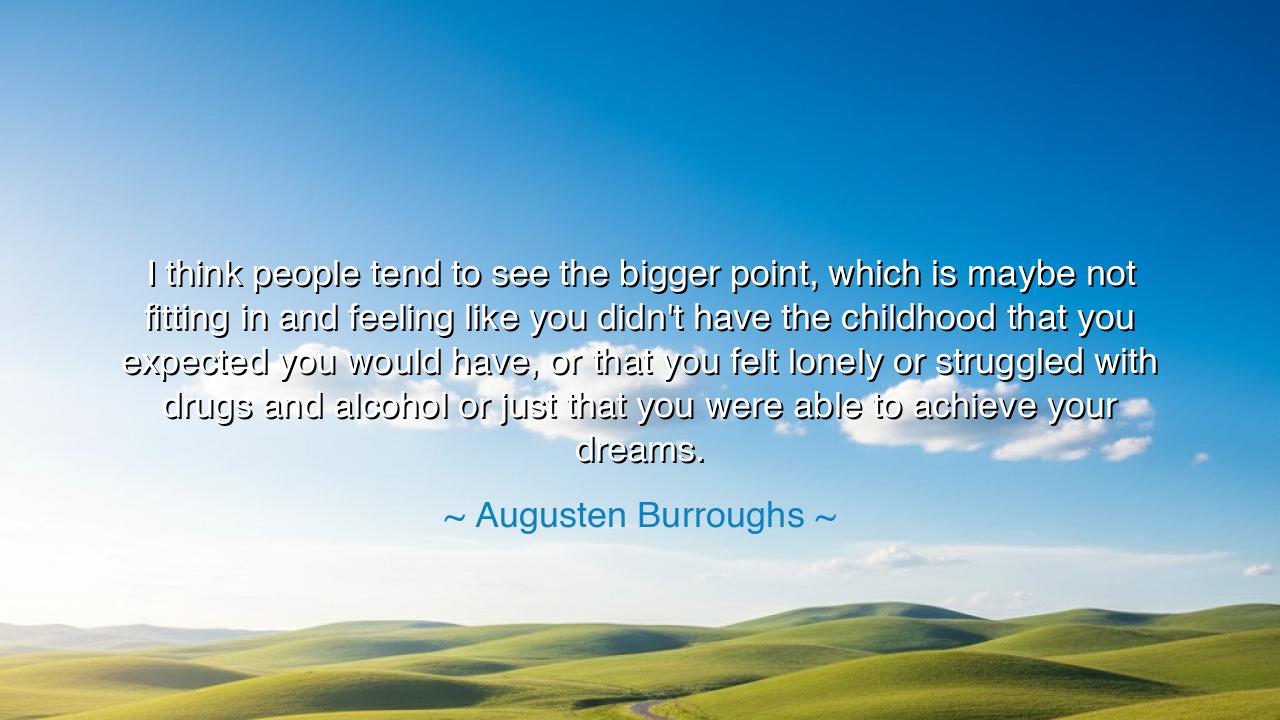
I think people tend to see the bigger point, which is maybe not
I think people tend to see the bigger point, which is maybe not fitting in and feeling like you didn't have the childhood that you expected you would have, or that you felt lonely or struggled with drugs and alcohol or just that you were able to achieve your dreams.






Hearken, children of truth and tenderness, and listen to the words of Augusten Burroughs, who has walked through pain and turned it into art: “I think people tend to see the bigger point, which is maybe not fitting in and feeling like you didn't have the childhood that you expected you would have, or that you felt lonely or struggled with drugs and alcohol or just that you were able to achieve your dreams.” In these words lies the deep pulse of the human experience — the truth that life, though filled with hardship and loneliness, can still lead to healing, creation, and triumph.
Burroughs, known for writing with raw honesty about his own chaotic upbringing, speaks here not merely of personal struggle, but of a universal wound. Every soul, at some point, has felt the ache of not fitting in, the sting of rejection, or the emptiness of an unrealized dream. Yet, in this quote, he reminds us that within these fractures of the self lies the path to strength. The bigger point, as he calls it, is not the pain itself but what emerges from it — the understanding, the compassion, the creative spark that turns suffering into meaning.
The ancients, too, knew this truth. Odysseus, long adrift and tormented by loss, did not return home unchanged. His pain shaped his wisdom. His loneliness gave birth to endurance. Likewise, Burroughs speaks for all who have wandered in their own emotional exile — through addiction, alienation, or disappointment — and yet found a way to craft purpose from the wreckage. This transformation, from anguish to art, from chaos to clarity, is the divine alchemy of the human spirit.
To speak of loneliness is to speak of one of the oldest companions of humanity. In every age, those who dream beyond the ordinary often walk alone. The prophets, the artists, the seekers — all have felt the sharp edges of difference. Burroughs’ reflection reveals that to feel out of place is not a curse, but a calling. The soul that does not fit neatly into the world is often the one destined to reshape it. And so, his words echo like a beacon for those who carry hidden burdens: your struggle is not your shame — it is your beginning.
Consider also the story of Vincent van Gogh, who battled isolation, mental torment, and rejection, yet painted visions of eternity in color. His loneliness did not destroy him; it transformed into beauty that still speaks across centuries. Like Burroughs, Van Gogh’s genius was forged in pain, his art a testimony that brokenness can yield brilliance. What both men teach us is that the struggle for belonging and meaning is not an obstacle to greatness — it is the soil from which greatness grows.
The lesson of Burroughs’ insight is both simple and profound: suffering, though it scars us, need not define us. The same life that wounds us also gives us the tools to heal. When we accept our imperfections, when we transform pain into empathy, when we help others carry what we have survived, we fulfill the deeper promise of our existence. To live honestly — to face what is — is itself an act of courage and creation.
Practical wisdom flows from this truth. If you find yourself lost, lonely, or haunted by what could have been, remember that every fragment of your story matters. Write, speak, create, reach out — not to erase your pain, but to redeem it. Let your journey be a lantern for others still walking through the dark. For as Augusten Burroughs teaches, the essence of human resilience is not in avoiding suffering, but in turning it into strength.
Finally, remember this: not every dream unfolds as expected, and not every life is free from hardship. Yet those who rise from despair with compassion and creativity become living testaments to hope. Burroughs’ words are a hymn for the wounded heart — a reminder that even those who did not fit in, who struggled and fell, can still achieve their dreams, not in spite of their pain, but because of it.






AAdministratorAdministrator
Welcome, honored guests. Please leave a comment, we will respond soon